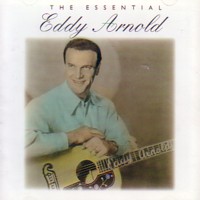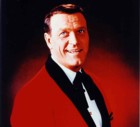

How Elvis was influenced by Eddy Arnold
The catalyst for his musical direction occurred following the death of his father in 1929. Forced to quit school to help out on the farm, Eddy earned extra money by playing at local square dances. Eddy's early career was not dissimilar to Elvis's. He frequented local radio stations, the medium of the masses before television came along. For six years he was a regular on Memphis radio although this was before Elvis joined his parents as a regular radio listener. In the late 1930s Eddy joined the 'Camel Caravan' a troupe of touring performers and he followed this with appearances on the Grand Old Opry. Until 1954 he was referred to by the rather unfortunate title, 'The Tennessee Plowboy' (a title engineered and promoted by one Colonel Tom Parker, but more on that relationship later). In 1944 Arnold was signed by RCA the label he is still with in 1998 (there was a three-year stint with MGM from 1973 to 1975). Registering on the charts with his first single in 1945, Each Minute Seems Like A Million Years that peaked at number 5, he followed this with three consecutive Top 10 hits before the first of his 28 number one hits on the country charts, What Is Life Without Love. Throughout the 40s and early 50s Arnold became one of the most instantly recognisable voices on radio, particularly in the southern states. As Edward Morris notes in his liner notes to the 1996 BMG CD release The Essential Eddy Arnold: "In the early 1950s, it was almost a foregone conclusion that a tall, handsome fellow with a golden voice and a pleasing manner would end up on television. Arnold made his entry into this infant medium in 1952." He would host a number of quarter hour shows for CBS and NBC and during this time the 'ploughboy' became an urbane gentleman. This was part of a deliberate strategy by the Colonel to smooth off some of [Eddy's] rural edges, in the hope of going for a national market. By the 1960s Eddy was a feature on network television in the US, even substituting for Tonight Show host, Johnny Carson. In one memorable segment he even danced with Ginger Rogers. A common factor between the success of Eddy Arnold and later success of Elvis Presley was their management by one, Colonel Tom Parker (the honorary Colonel tag was bestowed on him by Louisiana Governor, Jimmy Davis, during his time with Eddy). It was while managing Eddy Arnold (from the mid 1940s) that the Colonel perfected many of his 'management' strategies, including his 50% cut. Just as importantly, this was the time the Colonel put in place 'his team' - the team that would take Eddy to the top and would later do the same for Elvis with even more spectacular results. Members of the team included the Colonel's brother-in-law, Bitsy Mott, Oscar Davis, gofer Bevo Bevis and (the use of) the powerful William Morris Agency to book shows. It was during his management of The Eddy Arnold Show that one of the great stories of the Parker legend was born - Colonel Parker's Dancing Chickens. The device involved caged chickens dancing for their life on a hidden hotplate. The Colonel's stroke of genius was employed in order that the event be categorised as an agricultural show, thereby avoiding a $20.00 entertainment tax. How significant the Colonel's role was in Eddy's initial success is difficult to objectively judge. Eddy was already an aspiring star when the Colonel arrived on the scene and country music was a genre ready to explode on the national scene. At a minimum the Colonel's strategic moves regarding 'multi-media' exposure were very important as was his ability to ensure Eddy was paid for what he had previously not charged for - his live radio performances. An attempt to make Eddy a movie star failed and the Colonel's experience here undoubtedly planted the seeds for Elvis's movie success. The Colonel would manage Eddy until 1953 when his suffocating style of 'living and breathing' his artist took its toll and he was unceremoniously dumped by Eddy by way of a telegram which read: "Your services are no longer required. From receipt of this wire consider yourself dismissed."
The biggest of these was Make The World Go Away, covered by Elvis on his Elvis Country album and re-released later on the Elvis Great Country Songs CD. For Eddy Arnold the song reached as high as number 6 on the Billboard Top 40 Pop Charts. As a touring artist Eddy Arnold was a major drawcard and played "the" venues including Las Vegas, Lake Tahoe and Atlantic City. In 1996 he headlined at Carnegie Hall to a rousing reception. Early in his career Elvis was accused of stretching the musical boundaries of country music, an accusation also levelled at Eddy Arnold. More reasonably however, Arnold was a musical experimenter. In the early 50s he introduced orchestral backings in an attempt to broaden his appeal. In an 1990 interview Eddy Arnold commented: "I had recorded with a little group for so long that there wasn't anything else for me to do from an instrumental standpoint. I had to be reborn." In 1966 Arnold became the 7th artist elected into the Country Hall of Fame (Elvis was elected this year) and in 1970 he was voted its First Entertainer of the Year. Also that year RCA presented him with a plaque to acknowledge his global record sales of more than 60 million. By the mid-1990s his sales tally stood at 85 million. In 1984 The Academy of Country Music would present Eddy with the Pioneer Award and in 1987 he received the President's Award from the Songwriter's Guild. One indication of Eddy Arnold's importance to country music is his achievements on the country charts. As Billboard's All Time Top Country Artist, Eddy recorded an incredible 128 Top 40 hits on the national Country charts between 1945 and 1982. Of his 128 Top 40 hits, 28 reached the number one spot and 92 made the Top 10. This latter tally is the most by any artist - Webb Pierce ranking second with 78. In perspective, these feats place Arnold ahead of his country music peers such as Gene Autry, Garth Brooks, Willie Nelson, Dolly Parton, Hank Williams, Kenny Rogers, George Strait, Hank Snow, Johnny Cash, Ernest Tubb and Conway Twitty. It is interesting to note that Elvis's not inconsiderable Top 40 Country achievements are 66 singles, 31 Top 10 hits and 11 number one's which occupied the top spot for a total of 50 weeks. Some of Arnold's other chart achievements are simply mind-boggling: his 1947 version of I'll Hold You In My Heart (Till I Can Hold You In My Arms) occupied the number one spot for a staggering 21 weeks. In 1969 Elvis would record this song as part of his 'From Elvis In Memphis' sessions. In 1948, Eddy's single Bouquet of Roses almost matched this, staying at number one for 19 weeks. All in all, Eddy Arnold could well be regarded as the Elvis of the country charts. Eddy Arnold's influence on Elvis was multifold. If you listen to Eddy Arnold sing it is easy to realise how the prominence of his smooth, tenor voice (not unlike Dean Martin's) on the 1940s and 1950s airwaves influenced the vocal style of the young Elvis. In addition Eddy's multi-media success on radio and television and cross-over appeal with non-country music fans would also have held great attraction to an aspiring entertainer like Elvis. Apart from the tracks noted above, Elvis covered many other Eddy Arnold songs including Just Call Me Lonesome, It's Over (a regular inclusion in Elvis's live repertoire in the 70s), You Don't Know Me (featured in Clambake), It's A Sin, Something Old, Something New and How's The World Treating You. Sources:
This article was prepared by Nigel Patterson and first appeared in 'Elvis Monthly' as part of the author's fourteen part series, Influences On A Legend. ©1998, 2002 |

